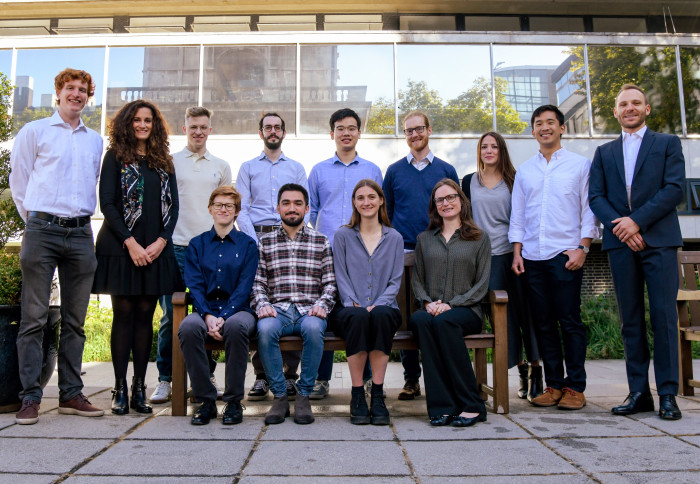Imperial scoops three new Royal Academy of Engineering research chairs

Professor Ruth Misener's collaborators at Imperial
Professors Ruth Misener, Michael Templeton, and Daniele Dini have been awarded three of eight new joint industry-academia research partnerships.
The partnerships will address some of the most complex challenges facing modern engineers, from new techniques to improve sanitation in developing countries to climate strategy innovation.
These projects will deliver societal benefit not only in the UK but also globally. Professor Karen Holford Chair, Academy Research Committee
Focusing on industry-relevant research across the full range of engineering disciplines, the Academy’s Research Chairs and Senior Research Fellowships scheme enhances the links between academia and businesses with each of the prestigious five-year positions co-sponsored by an industrial partner. Each awardee will establish a world-leading research group in their engineering field.
Data-driven decision making
 Professor Ruth Misener, Department of Computing
Professor Ruth Misener, Department of Computing
BASF / Royal Academy of Engineering Research Chair in Data-driven Optimisation
Professor Misener believes that developing data-driven, optimal decision making under uncertainty is key to achieving a sustainable society. Her new research partnership, sponsored by German chemicals company BASF, aims to repurpose machine learning methods for the chemical industry. In doing so, Professor Misener expects to help improve sustainability and energy efficiency by transforming the intersection between AI and the chemicals industry.
To do this, Professor Misener will develop numerical tools to contribute towards wider sustainability objectives and blend traditional, mechanistic model-based optimisation with data-driven optimisation.
Professor Misener said: “My existing collaboration with BASF colleagues is already very rewarding. Together with Imperial researchers and the Data Science for Materials and Chemicals teams at BASF, we have already made contributions in data-driven optimisation and developed open source software. I’m looking forward to an increased and intensified collaboration with BASF through this Research Chair."
Designing sanitation technologies
 Professor Michael Templeton, Department of Civil and Environmental Engineering
Professor Michael Templeton, Department of Civil and Environmental Engineering
Oxfam and Water For People / Royal Academy of Engineering Research Chair in Global Sanitation Technology
In 2015, the United Nations identified the ‘availability and sustainable management of water and sanitation for all’ as a Sustainable Development Goal. With his new partnership, Professor Templeton aims to address the goal’s associated engineering challenges by using robust approaches to designing, testing, and implementing novel onsite sanitation technologies and processes.
Examples will include more affordable, easier-to-assemble septic tank designs and modular methods to treat faecal sludge in rapidly urbanising cities and emergency settings. Sponsored by Oxfam and Water For People, Professor Templeton’s approach combines laboratory experiments, fieldwork, mathematical modelling, and collaboration with in-country practitioners and end users, to co-develop engineering solutions that will improve the lives of the poorest members of society in developing countries.
Professor Templeton said: “I’m excited to have this fantastic opportunity to collaborate with the in-country teams of Oxfam and Water For People – a collaboration with huge potential to make important impacts on the ground, by learning from local contexts and translating research findings into practice.”
Climate strategy innovation
 Professor Daniele Dini, Department of Mechanical Engineering
Professor Daniele Dini, Department of Mechanical Engineering
Shell Global Solutions / Royal Academy of Engineering Research Chair in Complex Engineering Interfaces
The climate crisis is the single biggest threat to present and future generations, bringing proposed technological strategies to meet ambitious targets like net zero greenhouse gas emissions. Limitations in these technologies are affected by key engineering interfaces in products and systems across the energy sector, and their evolution in operating environments. The ability to understand, predict, design and control interfaces could transform our capacity to create, optimise and deploy radical technological solutions on an unprecedented scale.
To deliver this kind of innovation, Professor Dini will work with Shell Global Solutions to develop molecular simulations, multiscale modelling, algorithms and software. Applications will include lubrication and cooling of interfaces in electric vehicles, nanoscale materials and surface design for optimised energy harvesting (for example wind turbines and triboelectric generators) and storage (for example batteries), and carbon capture, storage and utilisation.
Professor Dini said: “A long-term view of research is critical, allowing time for fundamental research and subsequent translation to complex systems. This RAEng Research Chair is key to support the growth and deepening of the partnership in the Engineering Interfaces area. I very much look forward to working with a team of present and future research leaders while playing an important role in the energy transition.”
“Investigating solutions to real-world problems”
Commenting on the announcement, Chair of the Academy’s Research Committee Professor Karen Holford said: “It is very encouraging that one of the Academy’s longest established funding programmes—now in its 35th year—received among its strongest set of applications to date and the number of awards we have made this time reflects this. I remain endlessly impressed at just how creative engineers are at investigating solutions to real-world problems and these projects will deliver societal benefit not only in the UK but also globally. The partnerships that support innovative engineering like this are vital to our future health and prosperity and the Academy values them very highly.”
Research Chairs and Senior Research Fellowships aim to strengthen the links between industry and academia by supporting exceptional academics in UK universities to undertake use-inspired research that meets the needs of the industrial partners. Awardees are expected to:
- Establish or enhance a world leading engineering research group
- Deliver 'use-inspired' research that meets the needs of their industrial partners
- Disseminate the outcomes of their research for appropriate academic impact
- Become a self-sustaining research group by the end of the award by securing substantial external grant income
This news story was adapted from a press release by the Royal Academy of Engineering.
Article text (excluding photos or graphics) © Imperial College London.
Photos and graphics subject to third party copyright used with permission or © Imperial College London.
Reporter
Caroline Brogan
Communications Division